
Historical Studies in the Natural Sciences
Scope & Guideline
Illuminating the Intersections of Science, History, and Philosophy
Introduction
Aims and Scopes
- Interdisciplinary Approaches to Science History:
The journal encourages contributions that draw from various disciplines, including history, sociology, philosophy, and anthropology, to analyze the development of scientific knowledge and practices. - Cultural and Social Contexts of Science:
Articles often explore how cultural, social, and political factors have influenced scientific developments, showcasing the interplay between science and society. - Focus on Non-Western Scientific Traditions:
There is a significant interest in examining scientific practices and traditions outside the Western context, contributing to a more global understanding of the history of science. - Critical Examination of Scientific Narratives:
The journal promotes critical perspectives on established scientific narratives, including the implications of colonialism, gender, and race in the history of science. - Methodological Innovations in Historical Research:
Research that employs innovative methodologies, such as digital humanities or interdisciplinary frameworks, is highlighted, reflecting the evolving nature of historical research.
Trending and Emerging
- Environmental History and Ecological Perspectives:
There is a growing emphasis on environmental history, exploring the interactions between humans and the natural world, reflecting contemporary concerns about ecology and sustainability. - Technoscience and Its Societal Impacts:
Research examining the implications of technoscience, including the ethical dimensions and societal impacts of scientific advancements, is increasingly prominent. - Decolonization of Science History:
A trend towards decolonizing the history of science is evident, with a focus on non-Western scientific traditions and critiques of colonial influences on scientific practices. - Interrogation of Scientific Authority:
Articles questioning the authority of scientific narratives and the politics of knowledge production are on the rise, reflecting broader debates about expertise and trust in science. - Public Engagement and Science Communication:
Emerging themes include the historical analysis of science communication and public engagement strategies, emphasizing the importance of engaging diverse audiences in scientific discourse.
Declining or Waning
- Traditional Natural History:
There has been a noticeable decline in articles that focus exclusively on traditional natural history, as the journal shifts towards more interdisciplinary and socially engaged perspectives. - Focus on Purely Scientific Discourses:
Contributions centered solely on scientific advancements without contextual analysis are becoming less frequent, indicating a move towards integrating broader narratives. - Historical Accounts of Major Scientific Figures:
While significant figures in science remain relevant, there is a waning focus on biographical studies alone, as the journal increasingly prioritizes collective and systemic analyses. - Narrowly Defined Scientific Practices:
Research that isolates specific scientific practices without considering their broader historical implications is less common, as the journal emphasizes interconnectedness in science history. - Exploration of Scientific Instruments:
The focus on the history of scientific instruments has diminished, with less emphasis on their technical details and more on their cultural and social significance.
Similar Journals

Dynamis
Empowering Voices in the Study of Science and MedicineDynamis is a distinguished journal published by EDITORIAL UNIV GRANADA, focusing on the interdisciplinary fields of History and Philosophy of Science as well as Medicine. Since its inception in 1981, this journal has provided a platform for scholarly discussion and exploration of the evolution of scientific thought and medical practices, with a consistent commitment to enriching academic dialogue up to the year 2024. Operating within the Q4 category for both History and Philosophy of Science and Medicine in the 2023 rankings, it holds a unique niche despite its positioning and aims to amplify underrepresented voices and perspectives via rigorous academic analysis. Although not currently an open-access publication, Dynamis continues to serve as a vital resource for researchers, professionals, and students who are keen to understand the historical contexts and philosophical implications in these fields. Its impact within the academic community is reflected in its Scopus rankings, offering valuable insights into the interplay between history, philosophy, and medicine. Situated in beautiful Granada, Spain, Dynamis remains committed to fostering a deeper understanding of the sciences through a historical and philosophical lens.

JOURNAL OF THE HISTORY OF BIOLOGY
Unraveling the Tapestry of Biological HistoryJOURNAL OF THE HISTORY OF BIOLOGY, published by Springer, stands as a vital academic resource devoted to examining the historical development of biological science and its philosophical dimensions. This esteemed journal, which has been in continuous publication since 1968 and encompasses research through 2024, is recognized for its significant contributions to the fields of Agricultural and Biological Sciences, and the History and Philosophy of Science, proudly holding a Q2 ranking in both categories as of 2023. With an ISSN of 0022-5010 and an E-ISSN of 1573-0387, it serves a diverse audience of researchers, professionals, and students interested in the interplay between biological advancements and historical context. The journal’s particular emphasis on interdisciplinary investigation provides a platform for innovative scholarship that enriches our understanding of not only the science itself but also its societal implications. While it does not currently offer open access, the rigor and reputation of the journal underscore its importance as a leading publication in the academic landscape of biological history.

Early Science and Medicine
Unveiling the Past, Shaping the Future of ScienceEarly Science and Medicine is a renowned academic journal published by BRILL, dedicated to exploring the intersections between historical and medical studies. With a distinguished history since its inception in 1996, the journal caters to an interdisciplinary audience, encompassing vital aspects of History, History and Philosophy of Science, and Medicine. It enjoys commendable rankings, being in the Q2 quartile in History, among others, reflecting its significant contribution to these fields. The journal's editorial commitments aim to advance scholarly discussions on the development of medical practices, theories, and their historical contexts, making it an essential resource for researchers, professionals, and students alike. Although currently not open access, Early Science and Medicine offers comprehensive analyses and rich content that engage with and enrich our understanding of the complex relationship between science and medicine throughout history. For more information, you can find the journal at its esteemed address in Leiden, Netherlands.
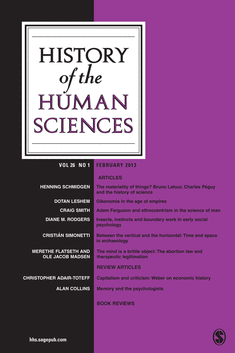
HISTORY OF THE HUMAN SCIENCES
Navigating the Complexities of Human ExperienceHISTORY OF THE HUMAN SCIENCES is a prestigious journal published by SAGE PUBLICATIONS LTD, dedicated to advancing the field of human sciences through multidisciplinary scholarship. With an ISSN of 0952-6951 and an E-ISSN of 1461-720X, this journal has been a cornerstone of research since its inception in 1988 and continues to address significant themes in history and philosophy of science. The journal boasts an impressive Q1 ranking in both History and History and Philosophy of Science categories as of 2023, underlining its impact and relevance in the academic community. Although not an open-access journal, it provides a wealth of scholarly articles that encourage critical dialogue and foster innovative thinking among researchers, professionals, and students alike. Located in the United Kingdom, the journal is committed to exploring the complexities of human experience and knowledge across varied contexts, making it an essential resource for anyone dedicated to understanding the historical dimensions of science and its philosophical implications.
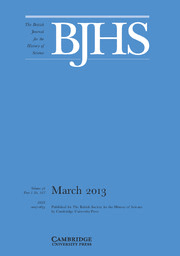
BRITISH JOURNAL FOR THE HISTORY OF SCIENCE
Fostering dialogue on the legacy of scientific ideas.The British Journal for the History of Science is a premier academic publication dedicated to exploring the intricate relationship between science and society throughout history. Published by Cambridge University Press, this journal features a rich blend of original research articles, critical reviews, and scholarly discussions that illuminate the development of scientific ideas and practices from antiquity to the modern era. With a strong reputation reflected in its Q1 classification in History and Q2 in History and Philosophy of Science for 2023, this journal plays an essential role in advancing the field by engaging researchers, professionals, and students alike. The journal's commitment to intellectual rigor and cross-disciplinary dialogue fosters a deeper understanding of how scientific thought has shaped our world. Although it does not offer open access, the journal maintains a strong academic footprint, making significant contributions to historical scholarship. Join a community of scholars who are passionate about unfolding the rich tapestry of scientific history, as the British Journal for the History of Science continues to publish cutting-edge research until 2024.
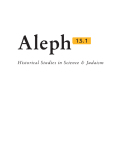
Aleph-Historical Studies in Science & Judaism
Bridging the Gap: Where Science Meets Jewish ScholarshipAleph-Historical Studies in Science & Judaism, published by Indiana University Press, is a pivotal journal at the intersection of history, religious studies, and the philosophy of science. With an ISSN of 1565-1525 and an E-ISSN of 1565-5423, this journal has gained recognition for its insightful exploration of the complex relationships between scientific practice and Jewish thought from 2009 to 2023. Operating from the heart of the United States, Aleph currently holds a Q4 category ranking in History, History and Philosophy of Science, and Religious Studies, reflecting a growing interest in its unique contributions to these fields. Notably, it ranks within the 79th percentile in Arts and Humanities History and Religious Studies, underscoring its significance in advancing scholarly dialogue. Although currently not an Open Access journal, it remains an essential resource for researchers, professionals, and students dedicated to uncovering the narratives that shape our understanding of science and religion.
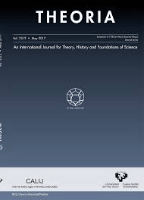
THEORIA-REVISTA DE TEORIA HISTORIA Y FUNDAMENTOS DE LA CIENCIA
Exploring the Foundations of Scientific ThoughtTHEORIA-REVISTA DE TEORIA HISTORIA Y FUNDAMENTOS DE LA CIENCIA, published by the Servicio Editorial Universidad del País Vasco, is a leading open access journal dedicated to advancing the fields of History, Philosophy of Science, and related disciplines since its inception in 2003. With a robust impact factor placing it in the esteemed Q1 and Q2 quartiles in its respective categories, this journal serves as a crucial platform for researchers, professionals, and students who are engaged in profound discussions and analyses of scientific foundations and historical contexts. Based in Spain, THEORIA has consistently demonstrated its commitment to scholarly excellence, achieving notable rankings in Scopus, particularly in the fields of Arts and Humanities, where it holds a rank of #169 in Philosophy and #59 in History and Philosophy of Science. The journal not only allows immediate open access to its diverse range of articles, fostering global knowledge dissemination, but also aims to bridge connections across varied philosophical inquiries and historical explorations within science. Join the dialogue today in shaping the future understanding of our scientific heritage.

CENTAURUS
Fostering Intellectual Engagement in the History of ScienceCENTAURUS is a prestigious journal dedicated to the History and Philosophy of Science, published by BREPOLS PUBL in the United States. With a storied history dating back to its inception in 1950, CENTAURUS has consistently provided a platform for critical engagement and scholarly discourse in the realm of scientific development and its philosophical implications. Recognized for its academic rigor, the journal holds a commendable Q2 ranking in the History and Philosophy of Science category for 2023, reflecting its substantial contribution to the field, as evidenced by its ranking in the top 11% of 223 journals in Scopus. Although it operates on a subscription-based model, the journal is a vital resource for researchers, professionals, and students seeking insightful analyses and discussions on the interplay between science and its philosophical dimensions. Published from Turnhout, Belgium, CENTAURUS continues to shape the landscape of scientific thought with its well-curated articles that examine over a decade's worth of scholarly contributions.
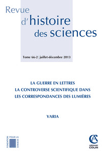
Revue d Histoire des Sciences
Chronicling the Evolution of Scientific Ideas.Revue d'Histoire des Sciences is a distinguished academic journal published by Armand Colin, focusing on the intricate interplay of history and philosophy within the sciences. Since its inception in 1973, the journal has served as a vital platform for researchers, scholars, and students interested in exploring the historical dimensions of scientific development. With an ISSN of 0151-4105 and an E-ISSN of 1969-6582, this journal is recognized within the academic community, achieving a modest 2023 Scopus ranking of Q3 in History and Philosophy of Science, positioning it within the 41st percentile of its category. The journal offers a prestigious space for rigorous discourse, critical analysis, and innovative research aimed at advancing our understanding of the scientific enterprise's past. While it operates under a traditional access model, the ongoing commitment to rich scholarly content ensures that the contributions will resonate with those dedicated to the intersections of history, science, and philosophy, providing insights into how historical context shapes scientific inquiry and advancement.

HISTORY AND PHILOSOPHY OF THE LIFE SCIENCES
Illuminating the Philosophical Foundations of Life Science NarrativesHISTORY AND PHILOSOPHY OF THE LIFE SCIENCES, published by SPRINGER INT PUBL AG, stands as a leading peer-reviewed journal dedicated to exploring the intricate relationships between historical narratives and philosophical frameworks in the life sciences. With its robust impact factor and recognized position as a Q1 journal in key categories such as Arts and Humanities, History, and History and Philosophy of Science, this journal provides a vital platform for researchers, professionals, and students seeking to delve into the theoretical underpinnings and historical trajectories shaping contemporary life sciences. Established in 1979 and evolving through its converged years until 2024, it reflects the journal's enduring commitment to advancing scholarly discourse in its field. While the journal is not open access, it nonetheless attracts a diverse readership, facilitating meaningful research exchanges and interdisciplinary dialogues. Located in the picturesque country of Switzerland, the journal invites contributions that foster critical examination and innovative thinking in the historiography and philosophy of life sciences, ultimately enhancing our understanding of this dynamic and significant discipline.